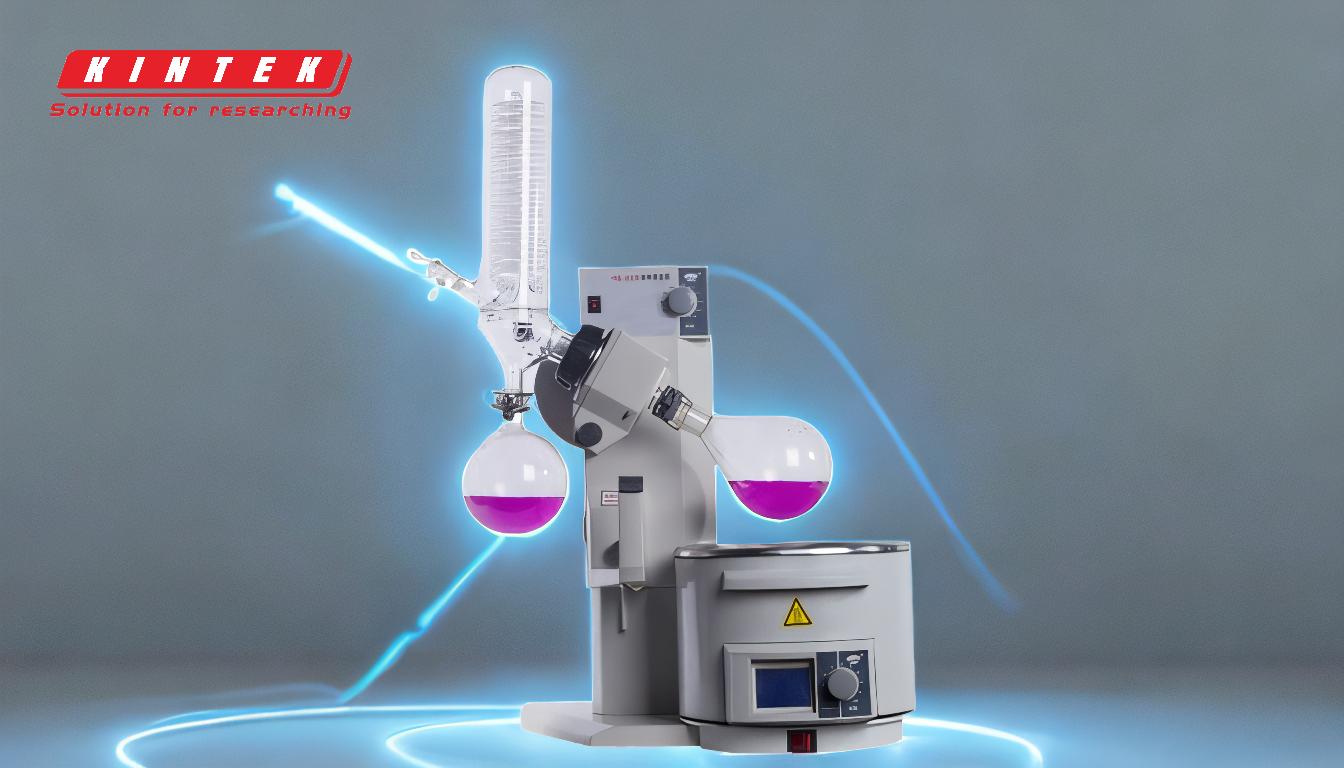A rotary evaporator is a versatile and essential piece of equipment in the food industry, primarily used for processes like distillation, concentration, solvent recovery, and extraction. It is particularly useful for purifying and concentrating food products, such as extracting essential oils from plants, removing solvents or water from juices, and preparing food extracts for further analysis or use. The rotary evaporator operates under reduced pressure, allowing for the efficient separation of volatile solvents from food components without damaging heat-sensitive compounds. This makes it invaluable for applications like molecular cooking, where precise control over solvent removal and concentration is required. Additionally, it supports solvent recycling, which is crucial for sustainable and cost-effective food production.
Key Points Explained:

-
Distillation and Concentration
- Rotary evaporators are widely used in the food industry for distilling volatile solvents and concentrating food products. For example, they can remove water or solvents from juices, syrups, or plant extracts, resulting in a more concentrated product.
- The process is efficient because it operates under reduced pressure, lowering the boiling point of solvents and preventing thermal degradation of heat-sensitive food compounds.
-
Extraction of Essential Oils and Natural Compounds
- Rotary evaporators are ideal for extracting essential oils from plants, herbs, and spices. This is crucial for producing flavorings, fragrances, and natural additives used in food products.
- The equipment ensures that the extracted oils retain their aroma and potency, as the gentle evaporation process minimizes the risk of overheating and degradation.
-
Solvent Recovery and Recycling
- In food processing, solvents are often used for extraction or purification. Rotary evaporators enable the recovery and recycling of solvents, making the process more sustainable and cost-effective.
- This is particularly important in industries like molecular cooking, where precision and resource efficiency are key.
-
Preparation of Food Extracts and Distillates
- Rotary evaporators are used to prepare food extracts and distillates for further analysis or use in food production. For example, they can isolate specific compounds from natural products, such as antioxidants or flavoring agents.
- This is essential for creating high-quality, consistent food products with specific functional or sensory properties.
-
Molecular Cooking and Precision Applications
- In molecular cooking, rotary evaporators are used to concentrate flavors and remove solvents from delicate ingredients. This allows chefs to create innovative dishes with precise control over texture, flavor, and aroma.
- The ability to operate under reduced pressure ensures that heat-sensitive compounds, such as vitamins or volatile aromatics, are preserved during the process.
-
Drying and Crystallization
- Rotary evaporators are also used for drying and crystallizing food products. For example, they can remove residual solvents from powdered extracts or concentrate solutions to form crystals.
- This is particularly useful in the production of food additives, where purity and consistency are critical.
-
Applications in Beverage Production
- In the beverage industry, rotary evaporators are used to remove water or solvents from juices, teas, or alcoholic beverages, resulting in concentrated flavors or extracts.
- They are also used in the production of gin and other distilled spirits, where precise control over the distillation process is required to achieve the desired flavor profile.
-
Sustainability and Cost Efficiency
- By enabling solvent recovery and reducing the need for high-energy processes, rotary evaporators contribute to sustainable food production.
- They also help reduce costs by minimizing waste and improving the efficiency of extraction and concentration processes.
In summary, rotary evaporators play a critical role in the food industry by enabling the efficient and precise processing of food products. Their applications range from extracting essential oils and concentrating flavors to preparing food extracts and supporting sustainable production practices. The ability to operate under reduced pressure and handle heat-sensitive materials makes them indispensable for modern food innovation and quality control.
Summary Table:
| Application | Key Benefits |
|---|---|
| Distillation and Concentration | Efficient removal of solvents/water; preserves heat-sensitive compounds. |
| Extraction of Essential Oils | Retains aroma and potency; ideal for flavorings and fragrances. |
| Solvent Recovery and Recycling | Sustainable and cost-effective; reduces waste and energy use. |
| Preparation of Food Extracts | Isolates compounds like antioxidants; ensures consistent quality. |
| Molecular Cooking | Concentrates flavors; preserves delicate ingredients for innovative dishes. |
| Drying and Crystallization | Removes residual solvents; produces pure, consistent food additives. |
| Beverage Production | Concentrates flavors; used in gin and spirit distillation. |
| Sustainability and Cost Efficiency | Reduces costs; supports eco-friendly food production. |
Ready to enhance your food processing with a rotary evaporator? Contact our experts today to get started!










